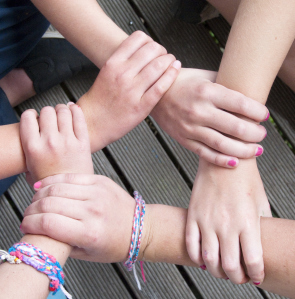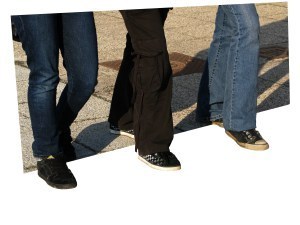Anarchy, Discord & the Kingdom of Heaven
So, I was making the morning coffee in that bleary-eyed way one does, thinking about making breakfast with one of my housemates whereupon I spied a bright green tri-fold brochure which heralded "Discordianism: The Un-Religion". My curiosity was piqued…
Anarchy
 One of my housemates is an Anarchist. I can tell you that his name is Henri because his name isn't actually Henri. We didn't get along very well at first, Henri and I. This, I think, is because I would periodically show up looking like a cleric, and he had a tendency to be rather loud and just as angry, which puts me off my tofu. Well, he's mellowed and I've started speaking, and we found out that we have a metric fuck-tonne in common in the basic principles on which we structure our lives.
One of my housemates is an Anarchist. I can tell you that his name is Henri because his name isn't actually Henri. We didn't get along very well at first, Henri and I. This, I think, is because I would periodically show up looking like a cleric, and he had a tendency to be rather loud and just as angry, which puts me off my tofu. Well, he's mellowed and I've started speaking, and we found out that we have a metric fuck-tonne in common in the basic principles on which we structure our lives.
I'm not tied to the Order Of Things, despite being part of it. Unsurprisingly, neither is he.
He wants to live in a world where we can spontaneously respect and love each other without having that legislated, orchestrated, and enforced by people who very clearly don't do it either. Me, too.
We mutually agree that there is an energy at work in the world that is beneficent, and that we can tap into it whenever we please, and fail to do so at our own peril. Futher, we agree that tapping into said energy is to be set free. He has a name for it. I have a name for it. Shakespeare taught me that names don't matter, however. But we agree on the energy, without reservation.
I've taught him what walking in the footsteps of Christ means to me, the Kingdom of Heaven, the Summary of the Law. How it pains me to see people use Christianity as a bludgeon and Jesus as an assault rifle. How I think it's a better use of my time to A) teach the Summary of the Law as a priest and meanwhile B) reform the church from within, rather than to strike out and be a non-denominational wandering spiritual teacher. At least, that's what I think at this point. And that is my point to him: This is what I have energy for, so this is the way I'm going to try and change my corner of the Universe for the better.
And he has taught me what true anarchy is. It's not rioting and vandalism. It's not protecting your own with a shotgun. It's Lennon's song, "Imagine". It's people living without sinning against one another, or repenting spontaneously when they do–that is, if you define sin the way I do, as a breaking of relationship: trust, love, friendship, understandings, contracts, handshakes, hopes, dreams and the best for each other whether anyone sees it or not. And when we can live without sinning against one another… then yes. We can live without governments. But we're not there, yet. Metaphorically speaking, Anarchy is a college level subject with certain rather important prerequisites, and we've only just mastered the use of commas in elementary school.
An Ancient Interlude
"Now is the time" by Hafiz
Now is the time to know
That all you do is sacred.
Now, why not consider
A lasting truce with yourself and God.
Now is the time to understand
That all your ideas of right and wrong
Were just a child's training wheels
To be laid aside
When you can finally life
With veracity
And love.
Hafiz is a divine envoy
Whom the Beloved
Has written a holy message upon.
My dear, please tell me,
Why do you still
Throw sticks at your heart
And God?
What is it in that sweet voice inside
That incites you to fear?
Now is the time for the world to know
That every thought and action is sacred.
This is the time
For you to deeply compute the impossibility
That there is anything
But Grace.
Now is the season to know
That everything you do
Is sacred.
Discord, The Religion
 Discordianism is an adorable religious movement that started in the seventies precisely where you'd imagine it might: the San Francisco Bay Area. And all of the fluff and stuff aside, it has some interesting points and some startling insights. Fluff and stuff aside, here is the text of "A Sermon on Ethics and Love"
Discordianism is an adorable religious movement that started in the seventies precisely where you'd imagine it might: the San Francisco Bay Area. And all of the fluff and stuff aside, it has some interesting points and some startling insights. Fluff and stuff aside, here is the text of "A Sermon on Ethics and Love"
One day, Malaclypse the Younger asked the messenger spirit Saint Gulik to approach the Goddess and request her presence for some desperate advice. Shortly thereafter, a radio came on by itself, and an ethereal female voice said, "YES?"
"O, Eris, Blessed Mother of Man! Queen of Chaos! Daughter of Discord! Concubine of Confusion! O! Exquisite Lady, I beseech You to live a heavy burden from my heart!"
"What bothers you Mal? You don't sound well."
"I am bothered with fear and tormented with terrible visions of pain. Everywhere people are hurting one another, the planet is rampant with injustices, whole societies plunder groups of their own people, mothers imprison sons, children perish while brothers war. O, woe."
"What is the matter with that, if it is what you want to do?"
"But nobody wants it! Everybody hates it!"
"Oh. Well, then stop."
At which point She turned Herself into an aspirin commercial and left the Polyfather stranded alone with his species.
And if that isn't to the core of A Course in Miracles, and Eckhart Tolle's teachings, and the revelation to Neale Donald Walsch, then I'm not sure what is. (And all of which, since I have just quoted them, you will imagine that I agree with to some greater or lesser degree. Usually greater, but not necessarily wholesale.) And so, I read the lime green brochure left in my kitchen by some friend of my house and I laughed at the nonsense and nodded at the wisdom, all the while my housemate stared at me in trepidation, waiting for me to be offended.
…Clearly, I am not representing myself and my personal theologies clearly enough to my housemates. But also, the world is about as ready for Discordianism as it is for Anarchy, or even… and this pains me… the Kingdom of Heaven.
A Nearly-Contemporary Interlude
"Imagine" by John Lennon
Imagine there's no Heaven
It's easy if you try
No hell below us
Above us only sky
Imagine all the people
Living for today
Imagine there's no countries
It isn't hard to do
Nothing to kill or die for
And no religion too
Imagine all the people
Living life in peace
You may say that I'm a dreamer
But I'm not the only one
I hope someday you'll join us
And the world will be as one
Imagine no possessions
I wonder if you can
No need for greed or hunger
A brotherhood of man
Imagine all the people
Sharing all the world
You may say that I'm a dreamer
But I'm not the only one
I hope someday you'll join us
And the world will live as one
The Kingdom of Heaven
 Jesus had a lot to say about the Kingdom of Heaven (or as it is sometimes referred to, the Kingdom of God: same thing), but most of what he had to say was in parable form. Depending on which biblical scholar you ask, parables are either properly read as allegory, in which each element of the parable story has a one-to-one relationship with reality as we know it, or read as metaphor, in which there is a direct relationship between story and reality, but not every single element has a specific role, or as none of the above. The None Of The Above option proposes that a parable is supposed to be a one-point story. Everything else, aside from the single point the listener is supposed to get from it, is just window dressing, to give the story substance.
Jesus had a lot to say about the Kingdom of Heaven (or as it is sometimes referred to, the Kingdom of God: same thing), but most of what he had to say was in parable form. Depending on which biblical scholar you ask, parables are either properly read as allegory, in which each element of the parable story has a one-to-one relationship with reality as we know it, or read as metaphor, in which there is a direct relationship between story and reality, but not every single element has a specific role, or as none of the above. The None Of The Above option proposes that a parable is supposed to be a one-point story. Everything else, aside from the single point the listener is supposed to get from it, is just window dressing, to give the story substance.
And none of this matters. There are two big take-home points of Jesus' parables. Point Number One: They're happening right now. The Kingdom of Heaven is not something to look forward to when we die, it's RIGHT NOW stuff. Point Number Two: It's the opposite of what mainstream society says is normal/good/right/obvious. This was true two thousand years ago and it's true now. We don't get it, largely, because few of us have degrees in ancient anthropology enough to say, 'hey, that story jesus just told would have totally put his audience on their head', but every single parable did.
So, the Kingdom of God, Jesus tells us, is RIGHT NOW, and NOT THE WAY YOU'VE ALWAYS DONE IT.
And what counter-cultural message did Jesus teach that would apply to that sense of immediacy and change? Love God with everything you've got, and if you find ourself confounded or confused, go on ahead and Love Your Neighbor as you Love Yourself, and you'll end up loving god without even realizing it. (This, from Matthew 22:34-40, or if you like, Mark 12:28-34, and there's fun times in Luke 10:25-28. Don't forget Leviticus 19:17-18, cause that's fun, and if you have a Gospel of Thomas handy, check out Logion 25. And if you're still bored, look at Deuteronomy 10:12-22. The Golden Rule can be found in Matthew 7:12, and we've been staunchly instructed to LOVE OUR ENEMIES in Matthew 5:43, which between God, ourselves, our neighbors and our enemies… that seems to fit everybody in, don't you think? Okay, enough with the bible quotes.)
And what did the first Christians do? (Or at least some of the first christians, according to the Acts of the Apostles Chapter 2, verses 43-47.) They sold their possessions, gave the proceeds to the poor, held all their goods and remaining wealth in common, spent a lot of time together, and lived and ate with glad and generous hearts. They loved one another as Christ loved them. It's amazing what we can do when we see positive behavior modeled for us. These first Christians lived out the Kingdom of Heaven they wished for everyone else. They practiced what they preached. They were the change they wanted to see in the world, to paraphrase Gandhi.
And it didn't last. There are pockets of people here and there who do this sort of thing, or part of it. I live in one such community, but we're not common, we're often mocked, belittled and held in derision. :Shrugs: The people who do that clearly don't get it, and that's okay, because the Kingdom of Heaven is a concept whose time has not yet come, ditto anarchy and discordianism. At least, it can't function on a really large scale. But these concepts? They do work on the small scale, and it is in the small scale that we will eventually hit the tipping point to be able to work with veracity and love on the large scale. But it starts here. It starts at home. It starts in my home, and in yours.
 So here's the challenge: You and me. It's up to us. We can choose, and no one can require of us otherwise, to love our neighbor as ourselves. This means we have to love ourselves. This may take some time all on its own. Love means respect. We have to respect ourselves. For some people, this require years in therapy. For others, it requires just a few changes made after a long couple of periods of thought. And building on the foundation of loving yourself, and watching other people loving and respecting themselves, we can start to love the people around us. And love means respect, it means value, it means know deeply. It means to work in the best interest, or in the mutual interest, and not just in your own self interest. And this will change our business practices. And it will change our buying practices. And it will change the way we speak. And it will change the way we think. And it will change the way we feel and react to the world around us. And that's just you and me, because in the end, the only and I mean only person you can change is yourself. And if you don't change yourself, what right do you have to ask someone else to change? None. No right at all.
So here's the challenge: You and me. It's up to us. We can choose, and no one can require of us otherwise, to love our neighbor as ourselves. This means we have to love ourselves. This may take some time all on its own. Love means respect. We have to respect ourselves. For some people, this require years in therapy. For others, it requires just a few changes made after a long couple of periods of thought. And building on the foundation of loving yourself, and watching other people loving and respecting themselves, we can start to love the people around us. And love means respect, it means value, it means know deeply. It means to work in the best interest, or in the mutual interest, and not just in your own self interest. And this will change our business practices. And it will change our buying practices. And it will change the way we speak. And it will change the way we think. And it will change the way we feel and react to the world around us. And that's just you and me, because in the end, the only and I mean only person you can change is yourself. And if you don't change yourself, what right do you have to ask someone else to change? None. No right at all.
And so, as someone who is changing herself, and has been for some time now, I'm asking you, I'm challenging you to do the same. You have the world to gain, and nothing at all to lose.
"Now is the time to understand that all your ideas of right and wrong were just a child's training wheels to be laid aside when you can finally live with veracity and love." Hafiz had it right. Let's start living our own small lives with veracity and love. You and me. Right now.











